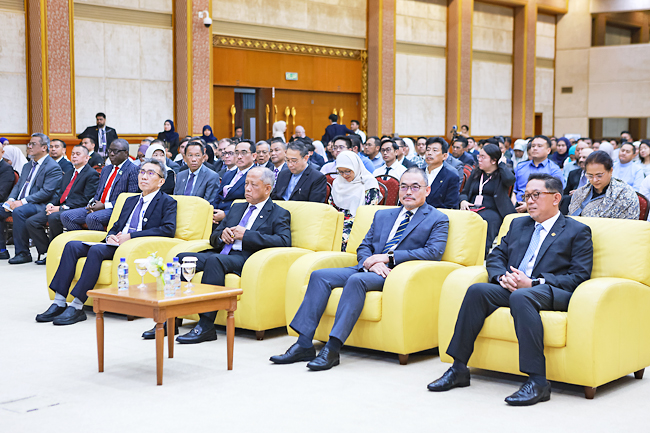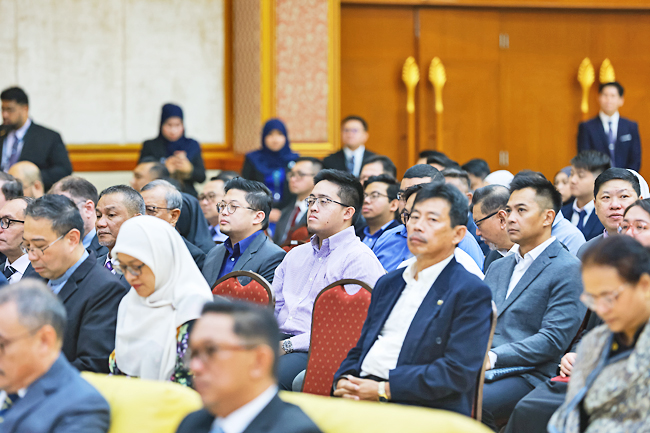When we talk about climate and the weather, we are also talking about the people’s health and well-being. Climate variability leads to the consequences of extreme weather conditions, affecting the natural environment, which provides clean air, food, water, shelter, and security.
Its effect is already upon us, with health and safety for the people and workers affected, and all natural systems due to the increased temperatures, ultraviolet radiation exposure, contact with pathogens, indoor-outdoor air pollution, and extreme weather can increase existing risks or create new ones, such as heat-related disorders, vector- and water-borne diseases, allergies, accidents, and losses.
The implications of extreme weather conditions are potentially high health costs, reduced quality of life, productivity, and economic losses.
This was the scene set by Minister at the Prime Minister’s Office and Minister of Defence II Pehin Datu Lailaraja Major General (Rtd) Dato Paduka Seri Haji Awang Halbi bin Haji Mohd Yussof in his keynote address at the recent Workplace Safety and Health Conference 2024.
In conjunction with World Day for Safety and Health at Work 2024, the minister also spoke of how climate change’s impact isn’t confined to outdoor workers; it extends to various sectors like agriculture, forestry, and construction. Indoor workers, particularly in heat-intensive industries, face risks too. Age, health, and socio-economic status can exacerbate these dangers.
“Climate change therefore warrants the study of new occupational hazards with due consideration of the risk exposure of specific vulnerable occupations,” said the minister.



To address climate-related risks in the workplace effectively, the minister emphasised that tailored strategies are crucial, reflecting the diverse workforce and regional hazards.
While research at the intersection of climate, occupational hazards, and worker vulnerability evolves, identifying emerging risks is imperative for prevention. Moreover, robust data collection on diseases, injuries, and hazards is essential to pinpointing at-risk workers and occupations, enabling cross-sectoral approaches. Enhancing domestic research on climate’s impact on workers is vital for informed policy-making, advancing occupational safety, and health responses. He added that it’s imperative to prioritise knowledge expansion to foster safer working environments amid changing climatic conditions.
The minister said in 2021, at the United Nations Climate Change Conference (COP26), Brunei reaffirmed its commitment to a low-carbon, climate-resilient future aligned with Brunei Darussalam’s National Climate Change Policy.
Goals include a 20 per cent reduction in greenhouse gas emissions by 2030 and achieving net-zero emissions by 2050 through energy transition and forest preservation.
In his keynote, the minister also emphasised on the urgency, reminding us of His Majesty Sultan Haji Hassanal Bolkiah Mu’izzaddin Waddaulah ibni Al-Marhum Sultan Haji Omar ‘Ali Saifuddien Sa’adul Khairi Waddien, Sultan and Yang Di-Pertuan of Brunei Darussalam’s titah, highlighting climate change as the most pressing challenge, urging both mitigation and adaptation efforts.
Brunei stresses not only reducing climate impact but also adapting to its effects to minimise harm and seize opportunities for a sustainable future.
Climate-related hazards in the workplace are set to escalate, said the minister, posing significant risks to health and safety, especially in tropical Southeast Asia. Limited information hampers crafting effective measures at policy, sectoral, or industry levels. He believes that initiatives like the Workplace Safety and Health Conference 2024 offer hope, fostering discussions on hazard recognition, assessing climate-vulnerable occupations, and devising strategies to mitigate impacts.
Organised by the Safety, Health, and Environment National Authority, such platforms promote preparedness, emphasising emergency planning and business continuity measures in response to natural disasters.
As the region grapples with rising temperatures and erratic weather patterns, proactive measures and collaborative efforts become imperative to safeguard workers and ensure resilient workplaces.
“As we confront these challenges, we must begin with education and awareness to foster a mindset of adaptation and resilience measures to safeguard the well-being of workers,” added the minister. “Governments and authorities, industries and the private sector, workers and employers, and civil society organisations play a crucial role and must come together to develop and implement policies that promote prevention, sustainable practices as well as training, reduce greenhouse gas emissions, and prioritise the protection of workers’ fundamental rights and well-being.”
The minister further noted that climate change directly affects occupational safety and health, impacting workers’ productivity across various sectors, from firefighters to farmers.
Recognising the interconnectivity of national policy, environmental sustainability, and workplace safety is vital for building a resilient and equitable future amid this urgent reality.
“Let us finally commit – together – to rise to the challenge before it is too late,” he added. – Rokiah Mahmud


